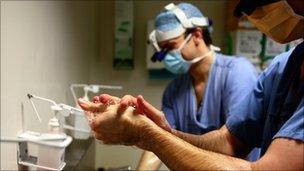Ministers to review curb on doctors hours
- Published

Two-thirds of junior surgeons said their training hours had been cut
Ministers are to review European rules that restrict the number of hours doctors can work.
Surgeons have long challenged the 48-hour limit on their working week saying it puts patients' lives at risk.
About 80% of 980 NHS surgeons and surgical trainees surveyed said care had worsened since the European Working Time Directive started last August.
A Department of Health spokesman said the way the directive was being applied was "clearly unsatisfactory".
The rules were designed to stop doctors working up to 80-hour weeks that were commonplace under the old system.
But the Royal College of Surgeons - which surveyed surgeons and surgical trainees in all nine surgical specialties - warned the changes had left hospitals overstretched and much less safe than they were a year ago.
More than a quarter of senior surgeons said they were no longer able to be involved in all of the key stages of a patients' care, up from 18% in October 2009.
The survey also found two thirds of junior surgeons said their hours in training had been cut - a quarter more than a year ago.
More than 60% of consultants who used to do surgery assisted by trainees said they were now often forced to operate alone, while 45% of consultants and 37% of trainees reported "inadequate handovers".
In addition, more than half to those surveyed said they consistently worked more than the permitted hours because of stretched rotas.
'Great problems'
RCS President John Black said surgeons not only thought patient safety was worse, but doctors' work and home lives were also poorer for it.
"To say the European Working Time Regulations has failed spectacularly would be a massive understatement.
"There is not a moment to lose in implementing a better system which would enable surgeons to work in teams, with fewer handovers and with the backup of senior colleagues," he said.
Charlie Giddings, president of the Association of Surgeons in Training, said "new innovative solutions" were needed, "rather than the minor short-term tweaks that artificially produced compliance at the expense of training and patient care".
Howard Cottam, president of the British Orthopaedic Trainees Association, said the directive had "largely failed" and the system "remained reliant on the professional integrity of trainees who continue to cover the gaps in the rota".
A spokesman for the Department of Health said: "The health secretary will support the business secretary in taking a robust approach to future negotiations on the revision of the European Working Time Directive, including maintenance of the opt-out.
"We will not go back to the past with tired doctors working excessive hours, but the way the directive now applies is clearly unsatisfactory and is causing great problems for health services across Europe."
The survey covered all Strategic Health Authorities in England as well as surgeons based in Scotland, Northern Ireland and Wales.
The RCS said it endorsed calls for a working week of up to 65 hours - including time spent on-call - to provide the ideal balance between adequate training opportunities, good patient care and work-life balance.
Bill McMillan, head of medical pay and workforce at NHS Employers, said: "We believe that NHS organisations are committed to ensuring that doctors are able to work and train in a way that is safe and effective for both them and their patients. We are not aware of any evidence that suggests that the new legislation specifically has led to an increase in errors."
Here are a selection of your comments